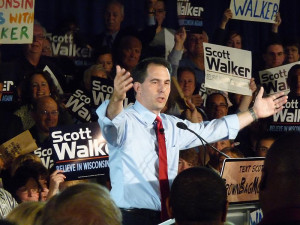A Wisconsinite Expat’s Take on Walker’s Victory

I spent the past three weeks visiting my family in Madison, Wisconsin. The Democratic Party’s effort to recall Governor Scott Walker has caused my home state to shed the Upper-Midwestern niceties I had come to know. You could cut the tension in the state’s supper clubs with a knife. I stepped into ground-zero of our nation’s hyper-partisan political climate. Both campaigns left more messages on my family’s answer machine than Brett Favre on a New York Jets cheerleader’s cell phone. It all ended last week. Walker, who has been demonized by liberals and canonized by conservatives for his push to limit collective bargaining rights, beat Milwaukee Mayor Tom Barrett for the second time in two years to become the first U.S. governor to ever survive a recall. Here are some takeaways:
As the Fox River Valley goes, so goes Wisconsin
A quick Wisconsin geography lesson. Most of the state’s population resides in the triangle formed by Madison, Milwaukee, and the Fox River Valley (Green Bay’s metropolitan area). Madison is a college town known for its liberal politics. Milwaukee, which has a large African American population, is a Democratic stronghold surrounded by very conservative suburbs.
The Fox River Valley is the state’s bellwether. The area has historically been a leader in the paper manufacturing industry and is home to many blue collar workers. Obama won this area by over 10 points in 2008. On Tuesday, Barrett lost the area by 20 points. All one needed to do was look at these results come in to know that Barrett was doomed.
Citizens United is changing U.S. elections; consider this the opening salvo
The recall effort made Walker a martyr by national conservatives and they paid him tribute. The state campaign finance filings show that Walker raised $30.5 million, with two-thirds coming from outside of Wisconsin. Walker’s donors including billionaire oilmen David and Charles Koch as well as Christy Walton, the daughter of Wal-Mart founder Sam Walton. Allied super PAC spending raises his total to $63.5 million. Walker’s war chest allowed him to outspend Barrett by nearly eight to one.
The cataclysmic flood of money into Walker’s coffers was made possible by the Supreme Court 2010 ruling in Citizens United v. Federal Elections Commission, which stripped government restrictions on independent political expenditures by corporations and unions. It is a sign of what is to come. Zealous conservative Super PACs will continue to use their new found clout to use states as petri dishes for prefabricated, troglodytic agendas. Democrats have so far failed to harness similar support from third party groups. The disadvantage will cost them more elections down the road.
This was not a referendum on the Obama Presidency
While the election was a major loss for State Democrats, one should reject the GOP’s claim that Walker’s victory as a harbinger of Obama’s fate in the state. The tired adage, “All politics is local”, applies here. The result reflected two things. First, the Democrats did not field a strong slate of candidates. Barrett is a rather middling candidate and his primary opponent, Kathy Falk, made a fatal mistake when she announced her complete and unqualified allegiance to the unions. The Democratic candidates that might have energized voters such as former U.S. Senator Russ Feingold or current U.S. Representative Ron Kind opted not to enter what promised to be an ugly fight. Second, more people than expected did not see a recall as warranted in this particular instance. The latter problem was compounded when the same Democrats fielded the same candidate who lost to Walker two years ago.
While Obama certainly will not match his 14 point victory here in 2008, this was not a referendum on the national economy or “Obama Care”. He remains the slight favorite in Wisconsin.
The Democrats and their Union allies overplayed their hand
After the Republican-controlled State Legislature passed Governor Walker’s proposed legislation to curtail collective bargaining rights for public employees amid waves of protests in the State Capitol, the Democratic Party (urged on by the public employee unions) sought to channel the outrage by organizing a series of recall elections for Republican members of the Legislature. Their big prize, however, was Walker.
Despite the initial energy, the recall campaign never really hit its stride. The Democratic primary was held in early May, giving them less than four weeks to coalesce around Barrett. Walker’s money advantage as well as Barrett’s failure to establish himself as a strong alternative led to an embarrassing defeat for Democrats and organized labor.
State Republicans have interpreted the victory as a mandate for their agenda and will seek momentum as they seek to increase their majority in the Legislature in November.